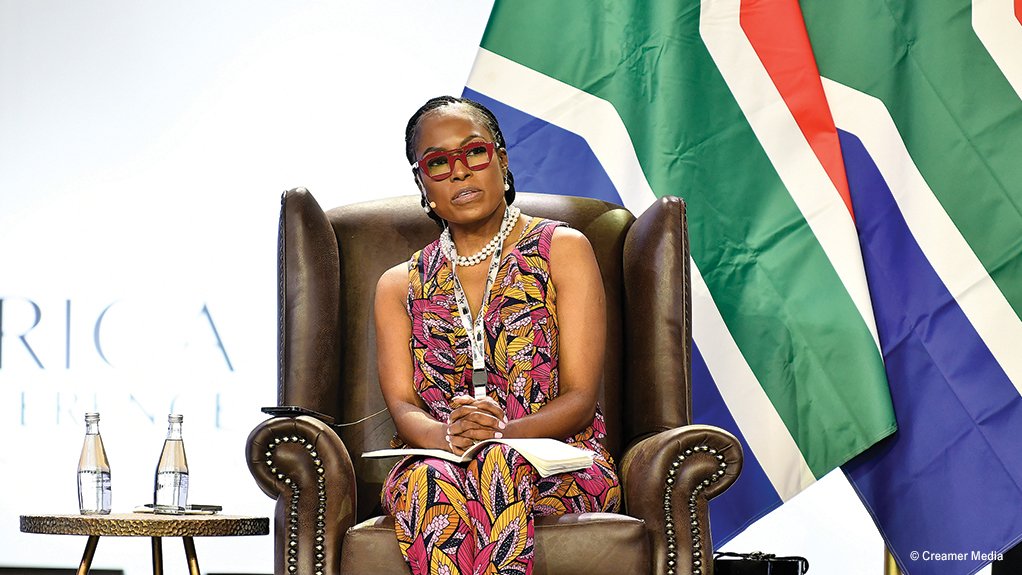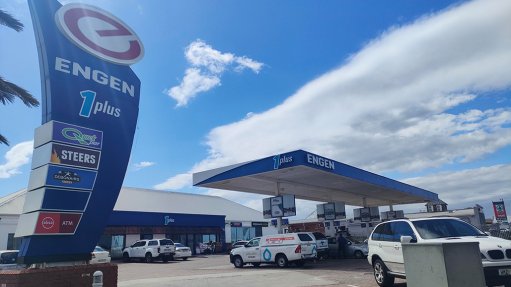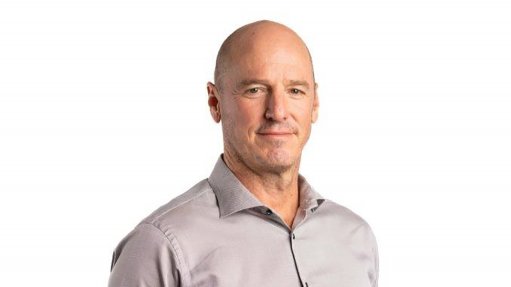Opinion: Transnet’s private sector invitation appealing from afar but far from appealing


Mirai Rail MD Pulane Tshabalala-Kingston
Photo by Creamer Media Chief Photographer Donna Slater
In this opinion article, CEO of voestalpine VAE SA and founder of Mirai Rail Corporation Pulane Tshabalala-Kingston argues that Transnet’s invitation to private bidders for 16 rail slots signals a key milestone. However, she argues that the capital and lending markets are unlikely to have the appetite to finance the scale of undertaking envisaged on the basis of a two-year contract and that a possible win-win alternative model should be pursued.
That our economy is ‘situation critical’ and that the freight rail sector is a key enabler for economic growth of the economy is by now so trite that it bears no further amplification. Suffice it to restate that far from being a mere cyclical trough spawned by distant, global financial events and the pandemic, our economic crisis is clearly structural, deep, multi-faceted and protracted.
South Africa’s Economic Reconstruction and Recovery Plan (ERRP) and its precursor, the National Treasury’s 2019 policy document, both rightly identified the parlous state of our network industries and infrastructure as key contributors to our economic woes. The diagnosis is not original to those two recent policy and planning prescriptions. The original triage for what ails these network industries, and how to treat them, was first articulated in 2012 in Chapter 4 of the National Development Plan.
As the backbone of our economic arteries, all progressive ideas aimed at infusing life into this and other network industries continue to receive enthusiastic support from all South Africans of goodwill.
I have previously argued that facilitating third-party access to Transnet’s rail network could be a game-changer, potentially boosting network capacity, enhancing rail freight reliability and predictability, as well as reducing the country’s overall logistics costs, currently among the highest in the world at 18% of gross domestic product. I fervently held and continue to hold that view.
Transnet has taken the first step in 160 years towards liberalising the rail freight market by inviting private sector bids for six container slots on its 714-km-long container corridor linking the Port of Durban and Gauteng, and a further ten on the South Corridor that connects Gauteng with the Eastern Cape province. This is as a means of easing bottlenecks in the South African economy while simultaneously driving a transformation agenda in the sector.
Unfortunately, this first step is unlikely to entrain us towards that destination. The biggest barrier to entry which militates against Transnet’s third-party experimental access scheme achieving its noble goals is the stipulated contract period of 24 months. That time period is impossibly short.
A SCHEME TO WHICH NEW ENTRANTS CAN’T HITCH WAGONS
The proposal has to square the circle of how it envisages private sector bidders securing the kind of funding needed to procure or lease the required locomotives and wagons to hitch together to run trains on these lines, when the commitment period is that short. Conservative estimates suggest that a three-locomotive, 50-wagon train could set bidders back anything in the range of R150-million to R200-million.
The capital and lending markets are unlikely to have the appetite to finance that scale of undertaking on the basis of a two-year contract. The market just doesn’t work that way. It is also hardly worthwhile for the bidders themselves to pursue such significant financing commitments, over so non-committal a deal. This stipulation risks the exclusion of many capable-yet-recent entrants to the sector, in favour of operators who either have Transnet-compliant rolling stock already or have been in existence for so long that they have sunk their costs.
This hurdle, placed as it is, in the very design of the experimental scheme by an organ of state, betrays a palpable failure to think through the socio-economic footprint of this major procurement undertaking. It is a hurdle that is likely to be higher and harder to scale for black-owned players in the rail sector, than their more established white-owned or institutional investor competitors.
South Africa’s ERRP pledges that its interventions will be “...geared towards promoting greater participation by black people, women, youth and persons with disability at all economic levels”. The National Treasury policy paper punted third-party access to the Transnet network as a way to “...encourage private sector participation; and introduce competition in ports and rail”.
The concepts of transformation and inclusive growth are firmly rooted in our Constitution’s allowance (if not directive) for legislative and other measures to be taken in pursuit of equality, that are designed to “...advance persons, or categories of persons disadvantaged by unfair discrimination”.
AN UNFORGIVABLE DERELICTION
Any failure to demonstrate a consciousness of the above, amply stated goals is an unforgiveable dereliction of responsibility. And that, respectfully, is what the proposed Transnet third-party, two-year-access scheme suggests.
Another sting in the tail for the current proposal is the tattered state of our country’s rail network. The perfect storm of ageing and in parts outdated technology, intermittent maintenance over the years, and astounding levels of vandalism pose a significant headache for Transnet, impacting efficiencies on among others, its coal line. If the state of this and our other lines is anything to go by, any successful bidders on the 16 available slots are in for a nasty shock when the state of the infrastructure they will be working with pixelates into focus - the slots are being made available on a “voetstoots” basis.
This could potentially set successful bidders up for major punctuality problems in plying the line while working to shipping and port stack deadlines. Private sector players entering the space could find themselves saddled with significant costs of contributing to infrastructure refurbishments and maintenance, to merely be able to fulfil their multi-lateral contractual obligations.
This is hardly the propulsion towards inclusive growth we need. Nor is it the competitive dividend that the ERRP envisages flowing from private sector involvement in network industries like freight rail.
WE DON’T HAVE TO GO DOWN THAT TRACK
The mere issue of the invitation to bid does signal a key milestone in a process that has been mulled over for the better part of a decade. There are a few options worth exploring in order to ensure that opening up the sector to private operators fulfils not only commercial, but also socioeconomic and transformation objectives.
For starters, it is critically urgent for Transnet to step up repairs to the dilapidated rail infrastructure. This would improve safety, reliability of services and operational efficiencies across the network. To fund these repairs and refurbishments, Transnet could dispose of some of its rolling stock whose state can be described as fit-for-operational-purpose, but requiring investment in repairs to bring it up to standard. Such rolling stock could be sold at reasonable prices, conditional upon the purchaser(s) having a customer base and guaranteeing volumes.
A WIN-WIN SCENARIO POSSIBLE
In exchange for upfront payment for the rolling stock, Transnet could give performance guarantees in favour of the purchaser(s). It could also agree to a downward-adjustment to the access tariff it collects per train.
Such a sale would allow Transnet to raise capital that it can use to upgrade the network, while the continued revenue streams from tariff collections shore up ongoing maintenance. In turn, the sale of these assets could lower barriers to entry, thus opening up the opportunity for transformation.
But crucially, as an organ of state, Transnet simply cannot be allowed to shirk its transformation mandate, especially in light of its recent confusing dance on the application of the Preferential Procurement Policy Framework Act. In the wake of the Constitutional Court nullifying the Finance Minister’s 2017 regulations, the State logistics company initially suspended its implementation of broad-based black economic–empowerment (BBBEE) criteria in its goods and services purchasing policy. But it has since reverted to the pre-2017 formula of an 80/20 weighting of price versus BBBEE status for tenders up to R50-million, and 90/10 for contracts over that threshold. That momentary stagger, coupled with the barriers to entry patent in the company’s third-party network access invitation to bid, cast Transnet in an unflattering light, on an issue that is an undebatable national imperative.
Tshabalala-Kingston CEO of voestalpine VAE SA and founder of Mirai Rail Corporation
Comments
Press Office
Announcements
What's On
Subscribe to improve your user experience...
Option 1 (equivalent of R125 a month):
Receive a weekly copy of Creamer Media's Engineering News & Mining Weekly magazine
(print copy for those in South Africa and e-magazine for those outside of South Africa)
Receive daily email newsletters
Access to full search results
Access archive of magazine back copies
Access to Projects in Progress
Access to ONE Research Report of your choice in PDF format
Option 2 (equivalent of R375 a month):
All benefits from Option 1
PLUS
Access to Creamer Media's Research Channel Africa for ALL Research Reports, in PDF format, on various industrial and mining sectors
including Electricity; Water; Energy Transition; Hydrogen; Roads, Rail and Ports; Coal; Gold; Platinum; Battery Metals; etc.
Already a subscriber?
Forgotten your password?
Receive weekly copy of Creamer Media's Engineering News & Mining Weekly magazine (print copy for those in South Africa and e-magazine for those outside of South Africa)
➕
Recieve daily email newsletters
➕
Access to full search results
➕
Access archive of magazine back copies
➕
Access to Projects in Progress
➕
Access to ONE Research Report of your choice in PDF format
RESEARCH CHANNEL AFRICA
R4500 (equivalent of R375 a month)
SUBSCRIBEAll benefits from Option 1
➕
Access to Creamer Media's Research Channel Africa for ALL Research Reports on various industrial and mining sectors, in PDF format, including on:
Electricity
➕
Water
➕
Energy Transition
➕
Hydrogen
➕
Roads, Rail and Ports
➕
Coal
➕
Gold
➕
Platinum
➕
Battery Metals
➕
etc.
Receive all benefits from Option 1 or Option 2 delivered to numerous people at your company
➕
Multiple User names and Passwords for simultaneous log-ins
➕
Intranet integration access to all in your organisation



















